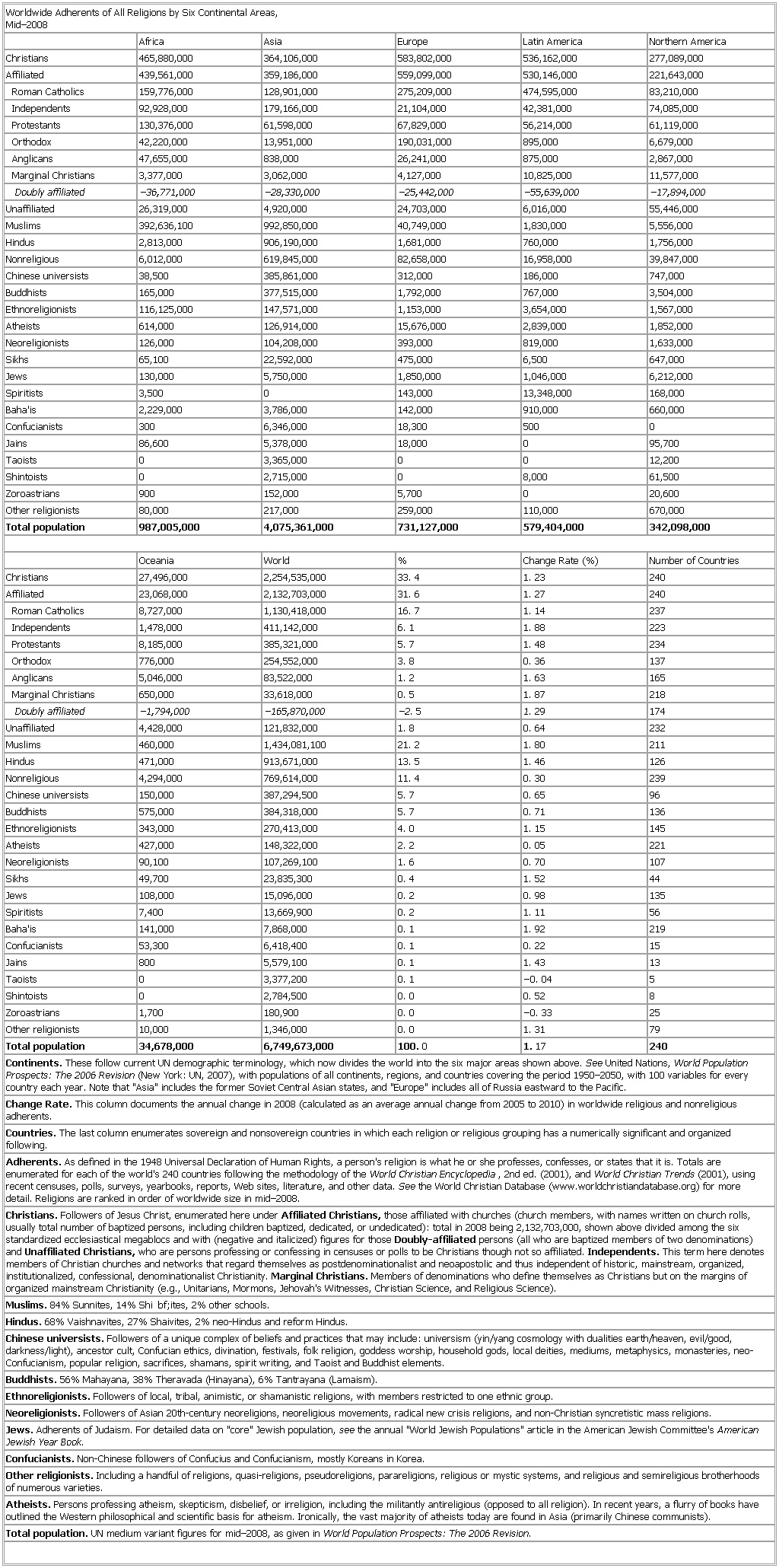- Worldwide Adherents of All Religions by Six Continental Areas, Mid-2008
-
▪ TableWorldwide Adherents of All Religions by Six Continental Areas,Mid–2008Africa Asia Europe Latin America Northern AmericaChristians 465,880,000 364,106,000 583,802,000 536,162,000 277,089,000Affiliated 439,561,000 359,186,000 559,099,000 530,146,000 221,643,000Roman Catholics 159,776,000 128,901,000 275,209,000 474,595,000 83,210,000Independents 92,928,000 179,166,000 21,104,000 42,381,000 74,085,000Protestants 130,376,000 61,598,000 67,829,000 56,214,000 61,119,000Orthodox 42,220,000 13,951,000 190,031,000 895,000 6,679,000Anglicans 47,655,000 838,000 26,241,000 875,000 2,867,000Marginal Christians 3,377,000 3,062,000 4,127,000 10,825,000 11,577,000Doubly affiliated −36,771,000 −28,330,000 −25,442,000 −55,639,000 −17,894,000Unaffiliated 26,319,000 4,920,000 24,703,000 6,016,000 55,446,000Muslims 392,636,100 992,850,000 40,749,000 1,830,000 5,556,000Hindus 2,813,000 906,190,000 1,681,000 760,000 1,756,000Nonreligious 6,012,000 619,845,000 82,658,000 16,958,000 39,847,000Chinese universists 38,500 385,861,000 312,000 186,000 747,000Buddhists 165,000 377,515,000 1,792,000 767,000 3,504,000Ethnoreligionists 116,125,000 147,571,000 1,153,000 3,654,000 1,567,000Atheists 614,000 126,914,000 15,676,000 2,839,000 1,852,000Neoreligionists 126,000 104,208,000 393,000 819,000 1,633,000Sikhs 65,100 22,592,000 475,000 6,500 647,000Jews 130,000 5,750,000 1,850,000 1,046,000 6,212,000Spiritists 3,500 0 143,000 13,348,000 168,000Baha'is 2,229,000 3,786,000 142,000 910,000 660,000Confucianists 300 6,346,000 18,300 500 0Jains 86,600 5,378,000 18,000 0 95,700Taoists 0 3,365,000 0 0 12,200Shintoists 0 2,715,000 0 8,000 61,500Zoroastrians 900 152,000 5,700 0 20,600Other religionists 80,000 217,000 259,000 110,000 670,000Total population 987,005,000 4,075,361,000 731,127,000 579,404,000 342,098,000Oceania World % Change Rate (%) Number of CountriesChristians 27,496,000 2,254,535,000 33.4 1.23 240Affiliated 23,068,000 2,132,703,000 31.6 1.27 240Roman Catholics 8,727,000 1,130,418,000 16.7 1.14 237Independents 1,478,000 411,142,000 6.1 1.88 223Protestants 8,185,000 385,321,000 5.7 1.48 234Orthodox 776,000 254,552,000 3.8 0.36 137Anglicans 5,046,000 83,522,000 1.2 1.63 165Marginal Christians 650,000 33,618,000 0.5 1.87 218Doubly affiliated −1,794,000 −165,870,000 −2.5 1.29 174Unaffiliated 4,428,000 121,832,000 1.8 0.64 232Muslims 460,000 1,434,081,100 21.2 1.80 211Hindus 471,000 913,671,000 13.5 1.46 126Nonreligious 4,294,000 769,614,000 11.4 0.30 239Chinese universists 150,000 387,294,500 5.7 0.65 96Buddhists 575,000 384,318,000 5.7 0.71 136Ethnoreligionists 343,000 270,413,000 4.0 1.15 145Atheists 427,000 148,322,000 2.2 0.05 221Neoreligionists 90,100 107,269,100 1.6 0.70 107Sikhs 49,700 23,835,300 0.4 1.52 44Jews 108,000 15,096,000 0.2 0.98 135Spiritists 7,400 13,669,900 0.2 1.11 56Baha'is 141,000 7,868,000 0.1 1.92 219Confucianists 53,300 6,418,400 0.1 0.22 15Jains 800 5,579,100 0.1 1.43 13Taoists 0 3,377,200 0.1 −0.04 5Shintoists 0 2,784,500 0.0 0.52 8Zoroastrians 1,700 180,900 0.0 −0.33 25Other religionists 10,000 1,346,000 0.0 1.31 79Total population 34,678,000 6,749,673,000 100.0 1.17 240Continents. These follow current UN demographic terminology, which now divides the world into the six major areas shown above. See United Nations, World Population Prospects: The 2006 Revision (New York: UN, 2007), with populations of all continents, regions, and countries covering the period 1950–2050, with 100 variables for every country each year. Note that "Asia" includes the former Soviet Central Asian states, and "Europe" includes all of Russia eastward to the Pacific.Change Rate. This column documents the annual change in 2008 (calculated as an average annual change from 2005 to 2010) in worldwide religious and nonreligious adherents.Countries. The last column enumerates sovereign and nonsovereign countries in which each religion or religious grouping has a numerically significant and organized following.Adherents. As defined in the 1948 Universal Declaration of Human Rights, a person's religion is what he or she professes, confesses, or states that it is. Totals are enumerated for each of the world's 240 countries following the methodology of the World Christian Encyclopedia, 2nd ed. (2001), and World Christian Trends (2001), using recent censuses, polls, surveys, yearbooks, reports, Web sites, literature, and other data. See the World Christian Database (www.worldchristiandatabase.org) for more detail. Religions are ranked in order of worldwide size in mid–2008.Christians. Followers of Jesus Christ, enumerated here under Affiliated Christians, those affiliated with churches (church members, with names written on church rolls, usually total number of baptized persons, including children baptized, dedicated, or undedicated): total in 2008 being 2,132,703,000, shown above divided among the six standardized ecclesiastical megablocs and with (negative and italicized) figures for those Doubly-affiliated persons (all who are baptized members of two denominations) and Unaffiliated Christians, who are persons professing or confessing in censuses or polls to be Christians though not so affiliated. Independents. This term here denotes members of Christian churches and networks that regard themselves as postdenominationalist and neoapostolic and thus independent of historic, mainstream, organized, institutionalized, confessional, denominationalist Christianity. Marginal Christians. Members of denominations who define themselves as Christians but on the margins of organized mainstream Christianity (e.g., Unitarians, Mormons, Jehovah's Witnesses, Christian Science, and Religious Science).Muslims. 84% Sunnites, 14% Shi bf;ites, 2% other schools.Chinese universists. Followers of a unique complex of beliefs and practices that may include: universism (yin/yang cosmology with dualities earth/heaven, evil/good, darkness/light), ancestor cult, Confucian ethics, divination, festivals, folk religion, goddess worship, household gods, local deities, mediums, metaphysics, monasteries, neo-Confucianism, popular religion, sacrifices, shamans, spirit writing, and Taoist and Buddhist elements.Ethnoreligionists. Followers of local, tribal, animistic, or shamanistic religions, with members restricted to one ethnic group.Neoreligionists. Followers of Asian 20th-century neoreligions, neoreligious movements, radical new crisis religions, and non-Christian syncretistic mass religions.Jews. Adherents of Judaism. For detailed data on "core" Jewish population, see the annual "World Jewish Populations" article in the American Jewish Committee's American Jewish Year Book.Confucianists. Non-Chinese followers of Confucius and Confucianism, mostly Koreans in Korea.Other religionists. Including a handful of religions, quasi-religions, pseudoreligions, parareligions, religious or mystic systems, and religious and semireligious brotherhoods of numerous varieties.Atheists. Persons professing atheism, skepticism, disbelief, or irreligion, including the militantly antireligious (opposed to all religion). In recent years, a flurry of books have outlined the Western philosophical and scientific basis for atheism. Ironically, the vast majority of atheists today are found in Asia (primarily Chinese communists).Total population. UN medium variant figures for mid–2008, as given in World Population Prospects: The 2006 Revision.See as table:

* * *
Universalium. 2010.
